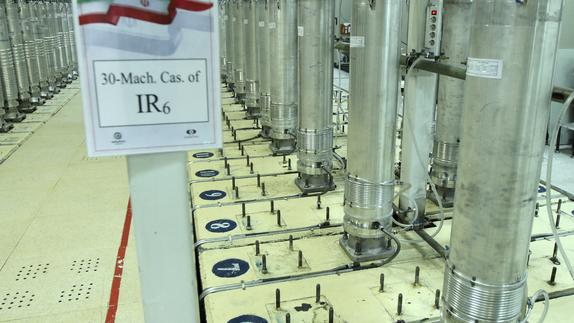 This photo taken on Nov 5, 2019 shows centrifuge machines in the Natanz uranium enrichment facility in central Iran. (PHOTT/ AP)
This photo taken on Nov 5, 2019 shows centrifuge machines in the Natanz uranium enrichment facility in central Iran. (PHOTT/ AP)
TEHRAN/VIENNA - Iran announced on Monday the extension for one month of its agreement with the International Atomic Energy Agency (IAEA) on monitoring the country's nuclear activities, semi-official Fars News Agency reported.
"Iran's decision on the continuation of the data-recording for utmost one more month was informed today" to IAEA Director General Rafael Mariano Grossi, tweeted Kazem Gharibabadi, Iran's ambassador and permanent representative to Vienna-based international organizations.
"The equipment and the verification and monitoring activities that we agreed (on) will continue as they are now for one month, expiring then on June 24," Grossi said at a news conference.
The International Atomic Energy Agency and Tehran struck the three-month monitoring agreement in February to cushion the blow of Iran reducing its cooperation with the agency, and it allowed monitoring of some activities that would otherwise have been axed to continue
The IAEA and Tehran struck a three-month monitoring accord in February to cushion the blow of Iran reducing its cooperation with the agency, and it allowed monitoring of some nuclear activities that would otherwise have been axed to continue.
Tehran said on Sunday this deal had expired and IAEA access to images from inside some Iranian nuclear sites would cease.
"The data from the last three months are still in the possession of Iran and will not be handed over to the IAEA. The data for the next month will remain only with Iran according to the agreement," Gharibabadi said.
Western diplomats have said that not extending the IAEA deal could seriously harm efforts to salvage the 2015 nuclear accord, which aims to keep Iran from being able to make nuclear arms, which Tehran says it has never wanted to build.
European diplomats said last week that failure to agree an extension would plunge the wider, indirect talks between Washington and Tehran on reviving the 2015 deal into crisis. Those talks are due to resume in Vienna this week.
"I recommend that they use this opportunity, which has been provided in good faith by Iran, and lift all the sanctions in a practical and verifiable manner," Gharibabadi said.
ALSO READ: IAEA: Iran enriching uranium with new advanced machine type
Zarif: Lifting sanctions is 'legal, moral obligation' of US
Lifting the sanctions imposed on Iran by former US President Donald Trump is Washington's "legal and moral obligation," Iranian Foreign Minister Mohammad Javad Zarif tweeted on Monday morning, in response to remarks by his US counterpart Antony Blinken.
Blinken said on Sunday in a TV interview that it is unclear if Tehran is willing to do "what is necessary to come back into compliance" with the Iran nuclear deal, formally known as the Joint Comprehensive Plan of Action (JCPOA).
Responding to the US secretary of state, Zarif warned that pressuring Tehran with sanctions to extract concessions "didn't work for Trump - won't work for you."
The sanctions imposed on Iran by Trump after he unilaterally pulled the United States out of the 2015 nuclear agreement in May 2018 are "not negotiating leverage," Zarif said.
Meanwhile, he demanded Washington release billions of US dollars in Iranian assets "held hostage abroad due to US bullying."
"Trump's legacy is past its expiration date," Zarif added, and he urged US President Joe Biden to "drop it".
On Sunday, Iranian President Hassan Rouhani said Tehran will continue to attend nuclear talks in Vienna until a final agreement is reached to revive the JCPOA.
He also repeated an earlier statement that "Washington has agreed to lift sanctions" on Iran, according to Iranian state media.
The JCPOA Joint Commission began to meet offline on April 6 in the Austrian capital of Vienna to continue discussions about bringing the United States and Iran to resume compliance with the nuclear deal.
Other parties to the talks and Iran's top nuclear negotiator have said some important issues need further discussion for revival of the nuclear deal.
To pressure President Joe Biden’s administration to return to the nuclear pact and lift sanctions, Iran’s hardline-dominated parliament passed a law last year to end its obligation to allow the IAEA short-notice inspections to check nuclear work is not being covertly put to military ends.
READ MORE: Iran has enriched uranium to up to 63% purity, IAEA says
To give diplomacy a chance, the watchdog and Iran agreed in February to keep “necessary” IAEA monitoring and verification activities in the Islamic Republic.
Iranian parliament speaker Mohammad Baqer Qalibaf told parliament's open session, aired by state TV, that Iran's ultimate authority, Supreme Leader Ayatollah Ali Khamenei, backed the law.
"Yesterday it was discussed and the decision was made. The law passed by the parliament will be implemented. The supreme leader has underlined the importance of implementing the law as well," Qalibaf said.


